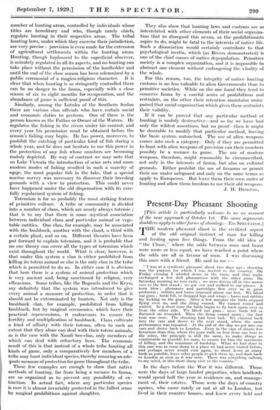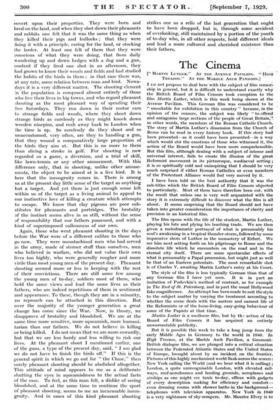Present-Day Pheasant Shooting
[This article is particularly welcome to us on account of the near approach of October 1st. The same arguments doubtless apply to other forms of shooting.—ED. SPECTATOR.] THE modern pheasant shoot is the civilized aspect of the old original instinct of man for killing and feeding upon live things. From the old idea of " the Chase," where the odds between man and beast were more or less equal, we have reached a point where the odds are all in favour of man. I was discussing this once with a friend. He said to me :- " I was at a syndicate pheasant shoot two days ago ; shooting was the purpose for which I was invited to the country. On Friday evening I whirled down in the train, and that night exchanged a few dull pleasantries with the other guns. On Saturday morning we rose early ; we were driven off in two motor cars to the first stand ; we got out and walked to our places. A horn blew ; pheasants and partridges flew over us in great profusion ; rabbits and hares swarmed about our feet. We lifted our guns ; birds fell, or dropped legs and wings ; hares and rabbits lay kicking on the grass. After a few minutes the birds stopped flying over us, and the firing ceased. We turned round and waited. In a short time the birds began to fly back again over us from the other side. We lifted our guns ; more birds fell or fluttered on wounded. Then the firing ceased again ; the first beat was over. The shooting had been bad. We climbed back into the cars and drove to the next stand, where the same performance was repeated. At the end of the day we got into our cars and drove back to London. Even in the case of shoots less luxurious than this, where the guns walk on foot from one beat to the other, the principle is still the same, to make things as comfortable as possible for man, to ensure for him the maximum of killing, and the minimum of hardship. What we had done in this case was to come down to a place we had never visited before, and perhaps never would visit again, to shoot down as many birds as possible, leave other people to pick them up, and dash back to London as soon as it was over. There was something callous, to my mind, in this short sharp visit to the country."
In the days before the War it was different. Those were the days of large landed properties, when landlords would spend half the year in residence on, and manage- ment of, their estates. Those were the days of country squires, who came rarely or not at all to London, but lived in their country houses, and knew every field and covert upon their properties. They were horn and bred on the land, and when they shot down their pheasants and rabbits one felt that it was the same thing as when they killed their pigs and bullocks ; that they were doing it with a principle, caring for the land, or stocking the larder. At least one felt of them that they were conscious of what they were doing, that from daily wandering up and down hedges with a dog and a gun, content if they fired one shot in an afternoon, they had grown to know their woods and fields and had studied the habits of the birds in them ; in that case there was, at any rate, some relation between man and bird. Nowa- days it is a very different matter. The shooting element in the population is composed almost entirely of those who live their lives in big towns, and who regard pheasant shooting as the most pleasant way of spending their free Saturdays. They run down in their motor cars to strange fields and woods, where they shoot down strange birds as carelessly as they might knock down wooden ninepins, and rush away back to London when the time is up. So carelessly do they shoot and so unaccustomed, very often, are they to handling a gun, that they wound a comparatively large proportion of the birds they aim at. But this is no more to them than slicing a stroke in golf. For shooting is now regarded as a game, a diversion, and a trial of skill, like lawn-tennis or any other amusement. With this difference only, that in shooting, unlike other amuse- ments, the object to be aimed at is a live bird. It is here that the incongruity comes in. There is among us at the present day little sense of the target as anything but a target. And yet there is just enough sense left within us of the target as a living animal to appeal to our instinctive love of killing a creature which attempts to escape. We know that clay pigeons are poor sub- stitutes for pheasants and partridges. The brutality of the instinct seems alive in us still, without the sense of responsibility that our fathers possessed, and with a kind of superimposed callousness of our own.
Again, those who went pheasant shooting in the days before the War were of a different calibre to those who go now. They were moustachioed men who had served in the army, made of sterner stuff than ourselves, men who - believed in warfare, who did not value their own lives too highly, who were generally rougher and more virile than most young men of the present day. Pheasant shooting seemed more or less in keeping with the rest of their convictions. There are still some few among the young men of to-day, soldiers most of them, who hold the same views and lead the same lives as their fathers, who are indeed repetitions of them in sentiment and appearance. To these, though they are in a minority, no reproach can be attached in this direction. But over the majority of the younger generation a great change has come since the War. Now, in theory, we disapprove of brutality and bloodshed. We are at the same time more sensitive, more squeamish, more humani- tarian than our fathers. We do not believe in killing or being killed. I do not mean that we are more cowardly, but that we are less hardy and less willing to risk our lives. At the pheasant shoot I mentioned earlier, one of the guns, a type of the present day, said, " I am glad we do not have to finish the birds off." If this is the general spirit in which we go out for " the Chase," then surely pheasant shooting should be abolished altogether. This attitude of mind appears to me as a deliberate shutting the eyes in squeamishness to the actual facts of the case. To feel, as this man felt, a dislike of seeing bloodshed, and at the same time to continue the sport of pheasant shooting, seems to me an inexcusable incon- gruity. And in cases of this kind pheasant -shooting strikes one as a relic of the last generation that ought to have been dropped, but is, through some, -accident of overlooking, still maintained by a portion of the youth of to-day who, in all other respects, hold different- ideals and lead a more cultured and cherished existence than their fathers.

































 Previous page
Previous page